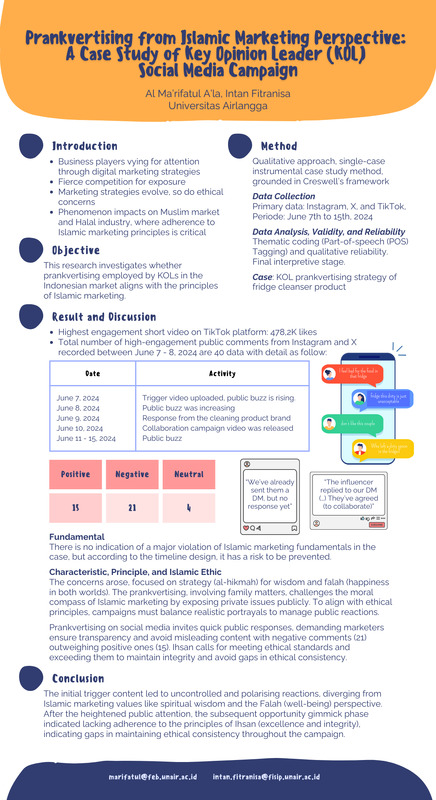Prankvertising from Islamic Marketing Perspective: A Case Study of Key Opinion Leader (KOL) Social Media Campaign
Item
-
Tittle
-
Prankvertising from Islamic Marketing Perspective: A Case Study of Key Opinion Leader (KOL) Social Media Campaign
-
Conference Acronym
-
IHSATEC 2024: 17th JHASIB
-
DOI Number
-
https://doi.org/10.31098/HST24107
-
Conference Date
-
December 19-20, 2024
-
presented at
-
The International Halal Science and Technology Conference 2024 (IHSATEC): 17th Halal Science Industry and Business (HASIB)
-
Poster Author(S)
-
- Al Marifatul Ala | Universitas Airlangga | Indonesia
- Intan Fitranisa | Universitas Airlangga | Indonesia
-
Conference Theme
-
IHSATEC 2024: 17th HASIB
-
Abstract
-
Background – Social media and the touch of creativity influence all business sectors, including marketing strategy. This phenomenon also impacts Muslim market and Halal industry, where adherence to Islamic marketing principles is critical. Public polarization on social media directs massive market opportunity targeted by key opinion leader (KOL) to enlarge their reach in promoting specific products and brands where some might cross the ethics line. One such strategy, Prankvertising, raises potential conflicts with the Islamic marketing ethical framework. Therefore, initial research must be done to evaluate the strategy alignment with Islamic marketing principles.
Purpose – This study examines the processes and stages of Prankvertising campaigns on social media and assesses their alignment with Islamic marketing principles. It investigates whether the strategies and impact of the campaign - including public responses - adhere to or diverge from ethical guidelines rooted in Islamic values.
Design/methodology/approach – This study implements qualitative approach using a single-case instrumental case study method centered on specific campaign within defined timeframe. Primary data were gathered from social media content and comments using pseudonyms to emphasize roles over personal identities. Rigorous analysis techniques were employed, including triangulation and thematic coding.
Findings – The analysis of the prankvertising campaign identified four key phases: the initial act, public response, opportunity gimmick, and official advertisement release with the Brand Ambassador announcement. While some phases aligned with the purpose and fundamentals of Islamic marketing, several aspects deviated from these guidelines. The initial trigger content led to uncontrolled and polarizing reactions, diverging from Islamic marketing values like spiritual wisdom and the Falah (well-being) perspective. After the heightened public attention, the subsequent opportunity gimmick phase indicated lacking adherence to the principles of Ihsan (excellence and integrity) required by Islamic marketing ethics, indicating gaps in maintaining ethical consistency throughout the campaign.
Research limitations – The study’s limitations arise from its reliance on data within a specific context timeframe on single-case instrumental design that may limit the generalizability of findings to other cases. Potential researcher bias in data interpretation could happen affecting the objectivity of the findings.
Originality/value – Previous studies analyzed Prankvertising as marketing phenomenon on humor perceptions while this study uniquely explores Prankvertising from Islamic marketing perspective.
Keywords: Prankvertising, Muslim influencer, Ethical marketing, Social media, Endorsement
-
Publisher Name
-
Yayasan Sinergi Riset dan Edukasi
-
Publication Date Online
-
19-12-2024


